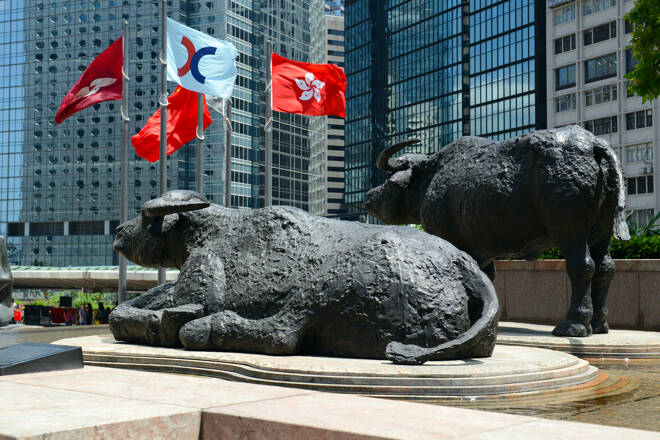Advertisement
Advertisement
Hang Seng Index, Nikkei 225, ASX 200: HSI Retakes 18,000 as Tech and Real Estate Gain
By:
Key Points:
- On Wednesday, June 19, the Hang Seng Index retook 18,000, boosted by gains in the tech and real-estate sectors.
- Overnight gains in US equity markets fueled demand for riskier assets.
- Economic indicators from Japan tested investor bets on a July BoJ rate hike while the hawkish RBA press conference resonated.
US Equity Markets Extend Gains on AI Stocks
On Tuesday, June 18, the US equity markets advanced, led by AI tech stocks. The Dow and S&P 500 rose by 0.15% and 0.25%, respectively, while the Nasdaq Composite Index gained 0.03%. Falling 10-year US Treasury yields, down 58 basis points, supported the gains. Investors reacted to softer-than-expected US retail sales figures.
However, US Futures were mixed. The Nasdaq mini and S&P mini were up 19 and 1 point, respectively, while the Dow mini fell by 24.
Rising Rate Cut Bets Boost Tech Stocks
Softer-than-expected US retail sales increased bets on a September Fed rate cut. The probability of the Fed holding steady in September dropped from 38.5% to 33.0% on Tuesday.
Rising bets on a September Fed rate cut fueled buyer demand for tech stocks despite lingering concerns about the Chinese economy.
China’s Economic Concerns and Stimulus Hopes
Investor jitters about China’s economy continued, affecting sentiment in Mainland China equity markets.
Recent data from China showed a decline in manufacturing activity, and Beijing has remained silent on new stimulus plans. Fresh stimulus measures from Beijing would improve investor sentiment toward the Chinese economy.
Furthermore, investors remained concerned about potential trade tensions if China retaliates against EU tariffs on electric vehicle imports. A retaliation against EU tariffs could test investor hopes of a Chinese economic recovery and impact demand for Mainland China and Hang Seng Index-listed stocks.
While the Mainland China equity markets began the Wednesday session in negative territory, the Hang Seng rallied.
Hang Seng Index Rallies on Fed Rate Cut Bets
The Hang Seng Index rallied 1.53% on Wednesday morning, driven by Fed rate cut bets. Lower borrowing costs aid a real estate recovery and benefit high-valued tech stocks.
The Hang Seng Mainland Properties Index (HSMPI) increased by 1.58%, with the Hang Seng Tech Index (HSTECH) advancing by 1.34%.
Alibaba (9988) and Tencent Holdings (0700) saw notable gains, rising by 1.25% and 1.33%, respectively.
However, the Shenzhen Composite Index and CSI 300 were down 0.40% and 0.20%, respectively.
Nikkei Higher on Weaker Yen and BoJ Rate Hike Bets
The Nikkei Index climbed 0.68% Wednesday morning, helped by a weaker Yen, with the USD/JPY nearing 159.
Softbank Group Corp (9984) led the rise, rallying 3.51% following overnight gains for ARM Holdings (ARM). Fast Retailing Co. Ltd. (9983) rose by 0.43%, with Sony Group Corporation (6758) up by 0.75%.
Economic indicators from Japan suggested the Bank of Japan may hold off on rate hikes until a sustainable recovery is evident.
The Reuters Tankan Index fell from 9 to 6 in June. Weaker sentiment across the private sector could signal a deteriorating macroeconomic environment. The Bank of Japan may remain in a holding pattern on interest rates until the economy shows signs of a sustainable recovery from Q1 2024.
Easing bets on a BoJ interest rate hike could weaken the Yen and drive buyer demand for Nikkei-listed stocks.
Trade data sent mixed signals. Exports were up 13.5% year-on-year in May after an increase of 8.3% in April. However, imports increased 9.5% after a rise of 8.3% in April. Economists expected exports to rise by 13.0% and imports by 10.4%. The softer-than-expected increase in imports may raise concerns about demand and output.
ASX 200 Saw Red as the RBA Press Conference Resonated
The ASX 200 slipped by 0.02% on Wednesday. The RBA’s hawkish tone from Tuesday impacted buyer demand for banks and tech stocks.
ANZ Group Holdings Ltd. (ANZ) and Commonwealth Bank of Australia (CBA) fell by 0.44% and 0.25%, respectively, with the S&P/ASX All Technology Index declining by 0.27%.
However, strong performances across the gold (XAU/USD), mining, and oil sectors limited the downside for the ASX 200.
Northern Star Resources Ltd. (NST) advanced by 0.60%, Woodside Energy Group Ltd (WDS) by 1.45%, and Fortescue Metals Group Ltd. (FMG) gained 1.49%.
For upcoming economic events, refer to our economic calendar.
About the Author
Bob Masonauthor
With over 28 years of experience in the financial industry, Bob has worked with various global rating agencies and multinational banks. Currently he is covering currencies, commodities, alternative asset classes and global equities, focusing mostly on European and Asian markets.
Advertisement
